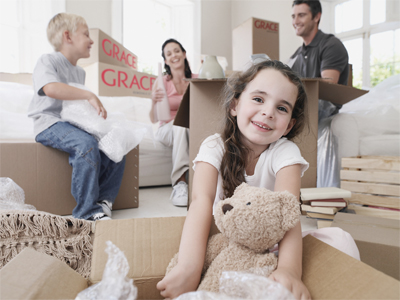Mark McCrindle Grace Removals Interview

Mark McCrindle Grace Removals Interview
We all know that moving house with your family is a lengthy process and there are many factors which are important when choosing that perfect home. Not only are you trying to please yourself and your partner but there's the convenience of being close to work, shops, public transport and parks to walk the dog. We also have to think about the kids: which school district they will be located in and how safe and clean the area is for the little ones.
But what really are the important drivers for those looking for their perfect new home?
A study by Grace Removals called Grace Removals 100 Years of Moving Homes research shed light on what Australians are really looking for in their perfect home. It found that almost one fifth of the nation has named house size as being the most important factor when looking for a new house to fit a family.
When you reach retirement it's not about baby boomers looking for the smaller humble abode anymore: the average number of people per household now is 2.66 yet this is thought to double in 2111 as we seek to care after our elders within our own homes after the younger ones have moved out.
We're also less loyal to our neighbours, with the average Australian having moved 7.88 times in his or her life time. But, despite this we're still a homely bunch as the majority of recent moves have occurred within the same state (85%) and four in five of these were within the same or adjoining suburb. 
Interview with Mark McCrindle
Celebrating 100 years of moving Australian homes, Grace Removals Group has teamed up with futurist, Mark McCrindle!
Question: Where you surprised at the findings of the Grace Removals most favoured space survey?
Mark McCrindle: In the survey of 2,051 Australians, of which half were females, we asked 'Where is your favourite space in your home?' The lounge room and living room came out as number one with the bedroom, study/office and veranda/yard following after that. The kitchen was the favourite space for only 4% of people in their current home. The place of relaxation for 40% of people was the living room, the key space of the home.
Question: What do women deem as the most important factors when moving homes?
Mark McCrindle: When we asked 'What would you like to have in your next home?' the focus was on the inside of the house including a bath, spa, shutters, air-conditioning and just over one in five stated inside features. The next biggest response was more space including larger bedrooms and larger backyards. Then electronics followed, including bigger TVs and better connections further to that was outside areas.
It is quite interesting because we think of ourselves to be into the outdoors including gardens, grass and verandas however that came after the inside features and space.
We asked 'What makes a home ideal?' and again the biggest response was that it was large enough and big enough for the family (19%) and then we had that the home was in a nice suburb, close to friends and family or that it was a new or newly renovated home. By the time we reached environmentally sustainable the response was 5%; four times as many people said a big place rather than a sustainable place which shows the home is the place to hang out, it's the castle and we want the space for that.
Question: What are the differences in importance over the generations eg. Gen Y, Gen X and Baby Boomers?
Mark McCrindle: We broke location down into location benefits including, it's on a nice street, it's on the beach, it's close to work, transport, schools and child care and that all counted for a lot. The home location was a very strong response across the generations.
We also asked across the generations 'Where is your favourite space in your home?' and it was quite interesting regarding the generations. The older the generation the more likely the lounge room was their key space, the younger the generation the more likely the bedroom was the key space. For example for the Baby Boomers just 8% said the bedroom was the key zone that mattered most whilst 37% of Gen Y's said the bedroom was the space that mattered most; that might be because the bedroom is their home in sense of their home within their parental house.
Particularly young people didn't choose the kitchen as their key area although the kitchen rate grew as we went into the family years, as when parents have children the kitchen becomes the central zone within the home.
Question: What do you think the most important factors will be for people moving home in 100 years?
Mark McCrindle: The survey was for Grace Removals who are celebrating 100 years, this year and because of that we said "let's think 100 years into the future and what the changes will be" and we asked Australians 'How do you think we will be living in 100 years, in 2111?'. We asked 'How many different family generations will live in the family home, in 2111?' and the biggest response was two generations, which is standard today. Surprisingly more than one in five (22%) said three generations and one in 20 said that they believed there would be four or more generations living in the one home. More than a quarter of all Australians believe that there will be three or more generations sharing the family home in the year 2111.
Three generational households are very limited now, you do have adult children living with their parents and sometimes those children have just started a family and moved back home whilst they save for a home or sometimes the baby boomers' adult children may not have left home and they have their elderly parents in for a little bit of care. However three generations within one home is quite rare and to think that may be average in the future, at least for a quarter of Australians, is interesting. It's not to say this may come to pass, it is the perception.
The number of people, per household has just increased for the first time, we had dropped to 2.6 people per household and we are closing on 2.7 people per household now. The thought was due to the growth in the couple-only household, the single person household, couples delaying starting a family and empty nesters that we'd actually have fewer people in homes because families are having less kids but it's actually turned around because of this intergenerational household. For the first time, particularly because of the economic-downturns we've had people delaying getting their own homes and living at home for longer as well as couples who have started families moving in with mum and dad, it's not a massive proportion but you have half of all 20 - 34 year olds living in the parental home and that means you have homes more occupied than we thought they would have been at this point.
Question: Australians are moving more frequently than ever before, do you think this will continue increase in time?
Mark McCrindle: Yes, it will. We are down to a medium length of time for living in a home of just over five years and that is down from the old rule of thumb that real estate agents used to throw around of seven years. The factors driving this are set to continue; we know that house mobility is higher and the length of time we spend in a home is shorter - it is easier to sell and more convenient, it is also higher amongst renters than owners and there are more people renting than owning. It is higher because of affordability; people don't buy the family home first, start a family there and becoming empty nesters in it.
We asked Australians 'How many moves have you had in your lifetime?' 30% have moved more than ten times. 62% of the population have moved home six or more times, of course some people have moved less because they are younger and some people have moved more because they're older but if you map that over a life stage, we really are going to be hitting that five year average and moving on, for the bulk of our lives.
MORE
- Katrina Allen Miss De Jour Interview
- 2012 DHL Express Fashion Export Scholarship
- Kelly Thompson Interview
- Taryn Williams Wink Model Agency
- Bernadette Black Brave Foundation
- Lisa Donath Just BU
- Mark McCrindle Grace Removals
- Meg Lanning Cricket Australia The Southern Stars
- Emily Rodda Get Reading Interview
- Dr Helen Szoke BackMeUp Campaign
- Dr. Peter Welburn Launch of LEO Pharma Australia
- Denise Roberts Screenwise
- Helen Kalafatic Producer
- Fay Staios The Angliss Spa Interview
- Charles Darwin University Practice Suite
- Kara Knudsen Target 100 Interview
- First Porsche Carrera Cup Female
- Furniture Workshops Renew Social Fabric
- Electrolux Appetite for Excellence Awards 2012
- Clare Wright M.A.D.E By Women: How Women...
- Jodie Fox The Telstra Australian Business...





